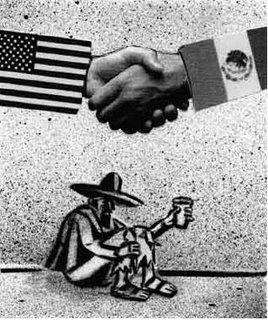The NAFTA shaft
 Finally, a good article appears in the mainstream media about the devastating effects that the North American Free Trade Agreement (NAFTA) has had on Mexican farmers and how the agreement has actually fueled the rapid rise in illegal immigration coming from south of the border. Peter Goodman at The Washington Post chronicles the ruinous policy, mired as it is in one-way favouritism for US goods -- especially agricultural products -- coming into Mexico. Maize farming in Mexico has been terribly hit by cheap and heavily subsidized corn pouring in from the US but deleterious effects from NAFTA have also been felt in smaller farms producing other agricultural goods like peppers, tomatoes and onions. Take Ruben Rivera's story. He once had a 7 acre farm and employed 150 people at harvest time. Now,
Finally, a good article appears in the mainstream media about the devastating effects that the North American Free Trade Agreement (NAFTA) has had on Mexican farmers and how the agreement has actually fueled the rapid rise in illegal immigration coming from south of the border. Peter Goodman at The Washington Post chronicles the ruinous policy, mired as it is in one-way favouritism for US goods -- especially agricultural products -- coming into Mexico. Maize farming in Mexico has been terribly hit by cheap and heavily subsidized corn pouring in from the US but deleterious effects from NAFTA have also been felt in smaller farms producing other agricultural goods like peppers, tomatoes and onions. Take Ruben Rivera's story. He once had a 7 acre farm and employed 150 people at harvest time. Now,Two hours south, in the village of Ejido Modelo Emiliano Zapata, Ruben Rivera sat on a bench in a forlorn plaza, rather than working on his seven-acre farm. He used to grow tomatoes and onions, hiring 150 workers to help at harvest. Now he doesn't even bother to plant. He can buy onions in the supermarket more cheaply than he can grow them. A crop of tomatoes yields less than the taxes. He lives off the $800 sent home monthly by his three sons, who run a yardwork business in Macon, Ga.The latest concern is poultry, which is expected to start flooding Mexican markets once the previously allowed tariffs expire this year. The single biggest expense in poultry production is feed; mostly this is corn. With corn production the single most heavily subsidized crop in the US -- more than $10 billion in subsidies in 2005 -- the cheaper chickens spell doom for Mexican poultry farmers, just as maize farmers have already been decimated.
"For people who can grow huge scale for export, NAFTA has been good," he said. "For people like us, it's been a bloodbath."
Unfortunately, this article fails to mention the political context of NAFTA and, in fact, is a story that should have come out months ago as the Mexican presidential campaign was being waged. It might have led to a better understanding of just why Obrador was regarded as such a threat to the established order of things. Having known the ruin that NAFTA had and continues to wreck on the rural population of Mexico, which has seen some 2 million farms jobs lost, Obrador was intent on correcting the wrong that NAFTA was doing to Mexico's small farms. Of course, the US Treasury Department stated that there would not be a renegotiation of NAFTA. The US government was perfectly happy with the situation as is. But with all such agreements between sovereign states, any party can choose to opt out if the they decide things are going horribly wrong. For Mexican farmers living under NAFTA, they were and it was Obrador's promise to correct the situation.
But the ultimate tragedy of this whole, dreadful tale is that the Mexicans don't want to come to the United States. Not really. Not if they can forge a decent living in their own country. But the policies behind an agreement like NAFTA have ironically forced them into seeking work in the States because US agriculture and trade policy have forced them into that unenviable position. At the same time, US politicians and various screaming meanies condemn the Mexican immigrants without the slightest mention of the failing policy, spearheaded by NAFTA, of slowly strangling the Mexican rural economy. At no time did any one politician, harping about building walls and rounding up "illegals," ever mention the disadvantage created for Mexican farmers by NAFTA, nor did they manage to make any connection between the swell of immigrants from the south and the ravaging of Mexican farms by US trade and domestic agricultural policy.
If we really wish to slap these trade agreements with the adjective, "free," then they should be just that. Otherwise, let's call it what it really is: a cheap labour and product dumping agreement.
Oh, I guess that doesn't sound so nice.


0 Comments:
Post a Comment
<< Home